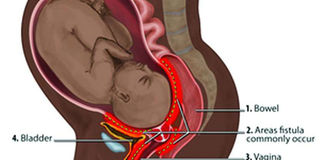Hope as surgeons innovate to save lives of women with fistula

Women in some communities still rely on traditional birth attendants for deliveries. This has been blamed for fistula cases because the lack of a professional could result in poor handling of the procedure. PHOTO | FOTOSEARCH
What you need to know:
- Uganda’s Ministry of Health estimates that at least 200,000 women in the country are living with fistula and 1,900 new cases occur each year.
High rates of teenage pregnancy and limited skills of medical workers have affected the fight against fistula in West Nile, health experts have said.
Dr Emmanuel Odar, a fistula surgeon and consultant gynecologist at Arua Regional Referral Hospital said at each surgical camp, over 50 mothers show up for operation of this condition and the demand is on the increase.
An obstetric fistula is an abnormal opening between a woman’s genital tract and her urinary tract or rectum. The condition is caused by prolonged, obstructed labour which often leaves women leaking urine, feces, or both.
A number of women have experienced this condition, operated on, but still continue to experience linkage of Urine.
Dr Odar saida woman only knows that she has healed when there is no leakage of urine noting that if the leakage continues, that means the nerve which controls it is damaged.
“For the women who have been damaged beyond repair, we have started diverting the urine during surgery. Urine is diverted through the intestine and it does not go to the bladder. Urine is absorbed in the intestine in a process called urinary diversion,” Dr Odar explained.
According to the doctor, several women in the six districts of Uganda’s West Nile region who have been permanently living with the condition but accessed fistula surgical camps -organized by Amref Health Africa in partnership with the Ministry of Health- have healed.
“Patients [who] have been operated using this method, have come for review, at the health facility and they are now dry," he said.
"We are going to carry on using this surgical method even to other women where the problem has reoccurred with support from Amref Health Africa and other partners.”
Health authorities say the urinary diversion method is approved and being used all over the world by scientists.
Why West Nile?
Urinary diversion is a surgical procedure that creates a new way for urine to exit your body when urine flow is blocked or when there is a need to bypass a diseased area in the urinary tract.
Dr Odar told Monitor that the operation is expensive and lasts about 4 hours in the theatre.
“It is being carried out in the West Nile region because the area has high occurrences of obstetric fistula,” he noted.
Dr Odar said the most affected are younger mothers and majority get the condition because they are not attended to by skilled birth experts owing to poverty and transport challenges.
Arua’s District Health Officer (DHO) Dr Paul Drileba said 25 percent of the mothers seeking antenatal care at the health facilities across the region are teenage mothers who are the most at risk of the Obstetric Fistula condition.
Dr Odar said urinary diversion costs about $400 (Shs1.4million), but "here it’s free of charge because partners like Amref Health Africa and the government are paying for it."
“This is a good strategy and we are hopeful that it will help to save the lives of women and also reduce the communal stigma,” Dr Odar said as he acknowledged that each surgical camp attracts over 50 mothers with the number on an increasing trajectory.
Amref Health Africa-UK has earmarked Shs6.9 billion through its project code-named Saving Mothers with or Risk of Obstetrics Fistula (SMOFI) intended to help about 504 women overcome the condition.
The project officer –Health at Amref –Uganda Patrick Oryema said the three-year project will cover West Nile sub region districts of Zombo, Yumbe, Arua, Nebbi, Koboko, and Moyo.
Project beneficiary Irene Angucia (not her real name) from Arua District told Monitor that she was diagnosed with obstetric fistula after she delivered an overweight baby.
“After the delivery, I started feeling pain in my private parts. I did not know that everything got torn as sitting became a problem. I could not seat where people gathered because urine and faeces were leaking out of me with a terrible smell,” a tearful Angucia said in an interview on Sunday.
“Now, I have healed and can carry on with work. I even delivered another child by caesarean operation.
However, she decried stigmatization of fistula patients which hinders timely treatment.
Uganda’s Ministry of Health estimates that at least 200,000 women in the country are living with fistula and 1,900 new cases occur each year.




